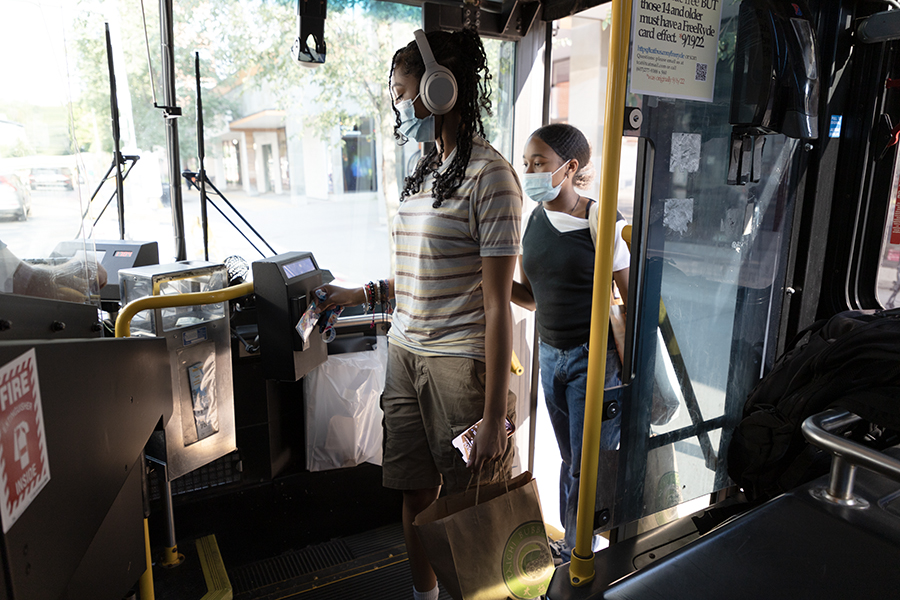Ithaca College students can ride the Tompkins Consolidated Area Transit for free during Fall 2023 because the college administration chose to temporarily cover the bill for bus fares.
This change will only be for the fall semester while TCAT works with the college to make student IDs compatible with the bus company’s new fare collection system. The fare collection system transitioned Aug. 15 and students will ride free from Aug. 17 until Dec. 15. The new Fast Fare Fareboxes are manufactured by Genfare LLC that allows the farebox to expand its capabilities when new technology emerges.
Patty Poist, manager of communications and marketing for TCAT, said the delay is caused by programming and supply chain issues that have prevented the TCAT from getting smartcards and mobile apps for the new fare system until October or later.
“We had to come up with some stopgap measures and this [subsidizing] is one of them,” Poist said. “So it’s really a really nice gesture on the administrators’ part and we really thank them for this.”
The plan to subsidize student ridership came from Tim Downs, vice president of finance administration and chief financial officer, and was approved by President La Jerne Cornish. Downs said that when TCAT representatives came to him with the farebox issue, he suggested that the college cover student fares if TCAT provided the same discount for employees as they do for students. The college already fully subsidized employee ridership and subsidized a percent of student ridership, so students received a discount on bus passes.
Downs said TCAT’s original proposal was that students wanting to buy a pass would email or call TCAT, pay over the phone and have a card that worked with the farebox shipped to campus. If students were buying passes like the monthly pass or 15 ride pass this process would have to be repeated for each renewal.
“We said, ‘That sounds awful,’” Downs said. “We just thought, ‘That’s already too much for the students. Let’s take that off the plate for them.’”
When boarding a TCAT bus, students need to show their student ID to the driver so each ride can be counted in the driver interface. Without showing a college-issued student ID, students will be required to pay $1.50 in exact change.
“As soon as these [smart]cards come in and as soon as the web portal is built, we’re going to have to have discussions with IC,” Poist said. “Right now, we’re just so focused on getting people educated about what they can do in the interim, and then we’ll figure out the permanent solution in the coming weeks for spring semester.”
One of the ways the college is helping to educate students about TCAT services is through orientation. The Office of International Programs introduced students to the TCAT on Aug. 17 when they learned about how to use public transportation in Ithaca and explored the city.
First-year student Abigail Monteagudo, an international student from the Philippines, said she is going to use the TCAT more often because it is free, but that in her hometown, the fares were much cheaper than the usual price in Ithaca.
“If converted to dollars it’s probably cents because it’s like seven pesos,” Monteagudo said. “And we had a lot of public transportation. So, when I went here I was like, ‘How do you go around?’ because there’s literally nothing, like only one bus.”
Monteagudo said she is used to having many transportation options like taxis, tricycles — similar to a tuk-tuk — and jeepneys. Another local transportation option becoming more popular is the Ithaca Bikeshare. Downs said he is in conversations with Scott Doyle, director of energy management and sustainability, about the bikeshare program and how to utilize that on campus as another form of transportation.
“If giving [fares] away doesn’t have people riding the bus more, then I’m not sure why that is,” Downs said. “There’s obviously a lot of measuring we want to do to make sure we provide the right options to students.”
With no car of their own, sophomore Autumn Zimmerman relies heavily on the TCAT to get to their job at Wegmans and back to campus. Zimmerman said they might actually increase their TCAT use while the college is paying for the full cost of student ridership.
“I definitely think it’s a good thing that the college is paying for this semester considering that Cornell pays for their student passes and also that Ithaca College is very expensive,” Zimmerman said. “Because it’s not a financial worry for me anymore, I think I’ll probably be more open to using [the TCAT] and going to places around Ithaca that I normally wouldn’t, had I not had [free] access.”
The TCAT website has an updated schedule for fall services in addition to a ride guide specifically for Ithaca College students. Only routes 11 and 65 have campus stops but Poist said the buses will have more stops throughout campus than in the past. Also, on Saturday nights, the last bus from The Commons to campus will leave after 1 a.m., which is much later than the 8 p.m. cutoff over the summer and even the 11:45 cutoff last fall, according to Poist.
Zimmerman said they usually take a bus from campus to The Commons and walk the rest of the way to Wegmans because there is no connecting route at a convenient time. They also said that because the last bus to campus each day is quite early, finding other ways to get home from work can be costly.
“I work usually until 9 or 10 [p.m.] because I take classes in the morning so there would be no buses running except for one I believe on Saturday, which is the only one that could take me back to the college otherwise I would have friends or other people take me back,” Zimmerman said. “There was a week where I had to get an Uber — that really does add up.”
Downs said the hope is to get student IDs working with the new farebox system but that ridership data will inform the college’s future decisions about subsidizing student fares. He said there should be data to review mid-way through the semester after the TCAT has been using the new farebox system for a bit.
“If we are able to really push the utilization of the bus system, that would be well worth a semester of covering the cost even if that number is far bigger than I thought it was going to be,” Downs said. “That would be a great test case to understand what could be possible for student ridership on TCAT.”















